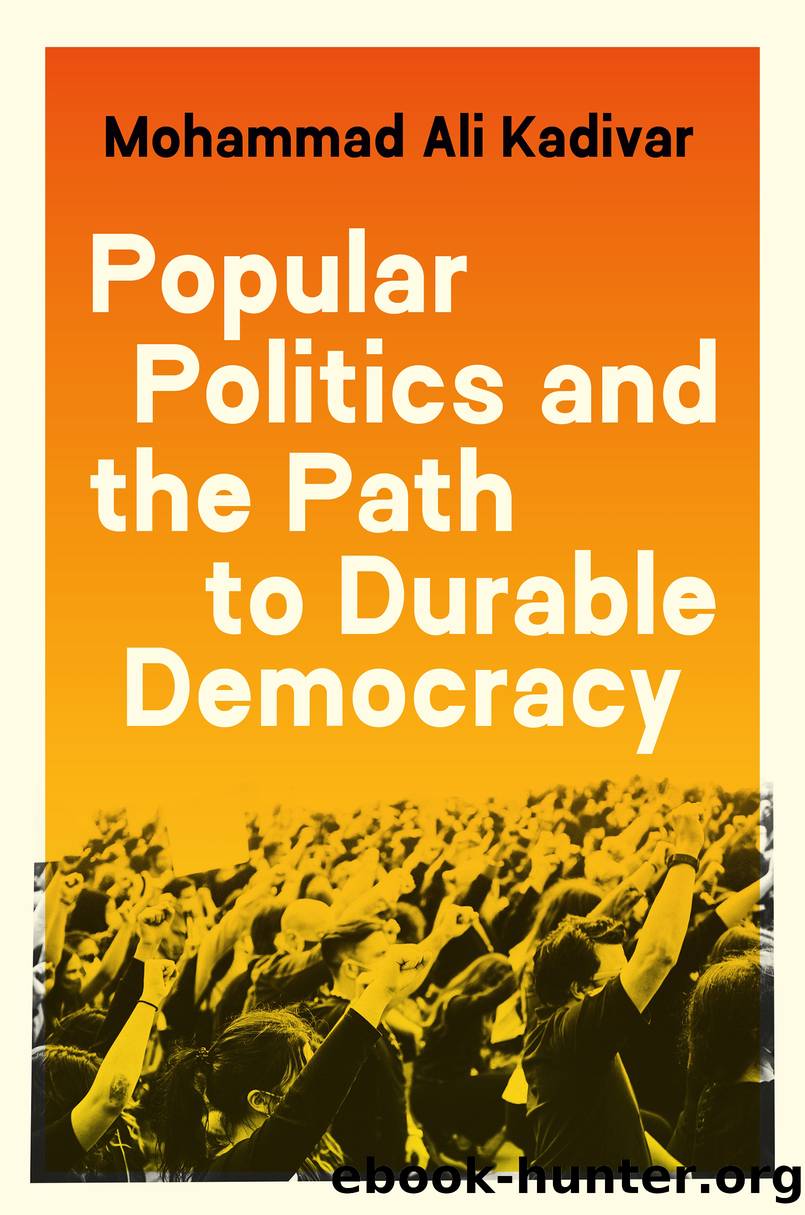Popular Politics and the Path to Durable Democracy by Mohammad Ali Kadivar

Author:Mohammad Ali Kadivar
Language: eng
Format: epub
Publisher: Princeton University Press
Published: 2022-08-05T00:00:00+00:00
Conclusion
Egypt provides an instructive example of the difficulties faced by a young democracy that emerges from a short-term mobilization. The January 25 uprising toppled Mubarak in about three weeks, but the movement lacked momentum to bring down powerful pillars of the regime, such as the military, the politicized judiciary, and the Ministry of Interior. These institutions actively sought to derail the democratization process in the post-Mubarak era. Besides, the movement emerged and succeeded so quickly in overthrowing Mubarak that it did not have time to engage in internal dialogue about the post-Mubarak period.
The alliances among participants in the January 25 Revolution soon crumbled over the parameters of the transition period. Groups that had participated in the January 25 uprising were split as to whether to use protest tactics or to participate in elections. They could not agree on who would lead the executive in the transition period, how soon elections would be held, and whether certain groupsâ electoral victories were a revolutionary success. The Muslim Brotherhood, enjoying a strong organization and confidence in its electoral performance, favored early elections. The non-Islamist opposition, anxious about its organizational weakness and electoral performance, demanded a longer transition period and postponement of elections.
The movementâs rapid success did not necessitate the organization building that is often associated with longer popular campaigns, such as those in South Africa and Poland. The non-Islamist revolutionaries did not have an organization that could earn votes in the 2011 and 2012 elections. Yet, the Muslim Brotherhood, an eighty-year-old Islamist group, had a large organization with chapters throughout the country that enabled it to succeed in several elections in 2011 and 2012. When revolutionaries and other non-Islamist parties failed to achieve their goals through electoral participation, they organized protests against the presidency of the Muslim Brotherhoodâs Morsi. Eventually, the military intervened to depose Morsi and assisted the return of the previous regimeâs holdovers. If the movement had not succeeded as fast as it did, revolutionaries would likely have grown a larger organizational infrastructure and, accordingly, would have done better in the subsequent election. In South Africa and Poland, at the time of national elections, both the African National Congress and Solidarity translated their power in the streets into seats in the legislature. If the non-Islamist opposition had secured more seats in parliament or won the presidency, Islamists and non-Islamists could well have reached a compromise because of the balance of institutional power. It is also likely that, in a longer movement, Islamist and non-Islamist forces would have agreed on a transition agenda despite their organizational disparities.
The case of Egypt suggests that short movements, though effective in creating a crisis for authoritarian regimes, are not as effective in transitioning the country to democracy. When a transition period begins, short movements may not be enough to guarantee a smooth transition to democracy. Opposition groups need to perform effectively in the posttransition elections, which requires alliance making and party building on behalf of democratic movements. Short mobilization periods may not provide enough time for
Download
This site does not store any files on its server. We only index and link to content provided by other sites. Please contact the content providers to delete copyright contents if any and email us, we'll remove relevant links or contents immediately.
The Secret History by Donna Tartt(19090)
The Social Justice Warrior Handbook by Lisa De Pasquale(12190)
Thirteen Reasons Why by Jay Asher(8912)
This Is How You Lose Her by Junot Diaz(6887)
Weapons of Math Destruction by Cathy O'Neil(6281)
Zero to One by Peter Thiel(5802)
Beartown by Fredrik Backman(5755)
The Myth of the Strong Leader by Archie Brown(5508)
The Fire Next Time by James Baldwin(5447)
How Democracies Die by Steven Levitsky & Daniel Ziblatt(5219)
Promise Me, Dad by Joe Biden(5154)
Stone's Rules by Roger Stone(5088)
A Higher Loyalty: Truth, Lies, and Leadership by James Comey(4964)
100 Deadly Skills by Clint Emerson(4926)
Rise and Kill First by Ronen Bergman(4789)
Secrecy World by Jake Bernstein(4753)
The David Icke Guide to the Global Conspiracy (and how to end it) by David Icke(4720)
The Farm by Tom Rob Smith(4514)
The Doomsday Machine by Daniel Ellsberg(4490)
